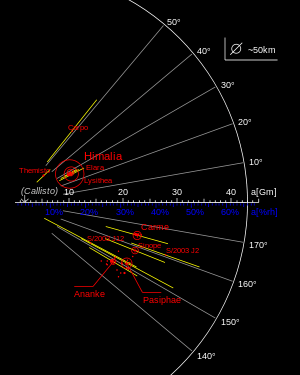Themisto (moon)
| Discovery | |
|---|---|
| Discovered by |
Charles Kowal (1975) |
| Discovery date |
September 30, 1975 |
| Designations | |
| Adjectives | Themistoan, Themistonian |
| Orbital characteristics | |
| Periapsis | 5,909,000 km (0.039 AU) |
| Apoapsis | 8,874,300 km (0.059 AU) |
Mean orbit radius | 7,391,650 km (0.04941 AU) |
| Eccentricity | 0.2006 |
| 129.82761 d (0.3554 a) | |
Average orbital speed | 4.098 km/s |
| Inclination |
45.81° (to the ecliptic) 47.48° (to Jupiter's equator) |
| Satellite of | Jupiter |
| Physical characteristics | |
Mean radius | 4 km[1] |
| Circumference | ~25 km |
| ~200 km² | |
| Volume | ~270 km³ |
| Mass | 6.89×1014 kg |
Mean density | 2.6 g/cm3 (assumed)[2] |
| Albedo | 0.04 (assumed)[1] |
| Temperature | ~124 K |
|
| |
Themisto (/θɨˈmɪstoʊ/; from Greek: Θεμιστώ), also known as Jupiter XVIII, is a small prograde irregular satellite of Jupiter. It was discovered in 1975, lost, and rediscovered in 2000.
Discovery and naming
Themisto was first discovered by Charles T. Kowal and Elizabeth Roemer on September 30, 1975, reported on October 3, 1975,[3] and designated S/1975 J 1. However, not enough observations were made to establish an orbit and it was subsequently lost. (See also lost minor planet.)
Themisto appeared as a footnote in astronomy textbooks into the 1980s. Then, in 2000, a seemingly new satellite was discovered by Scott S. Sheppard, David C. Jewitt, Yanga R. Fernández and Eugene A. Magnier, and was designated S/2000 J 1. It was soon confirmed that this was the same as the one observed in 1975.[4] This observation was immediately correlated with an observation on 6 August 2000 by the team of Brett J. Gladman, John J. Kavelaars, Jean-Marc Petit, Hans Scholl, Matthew J. Holman, Brian G. Marsden, Philip D. Nicholson and Joseph A. Burns, which was reported to the Minor Planet Center but not published as an IAU Circular (IAUC).[5]
In October 2002 it was officially named after Themisto,[6] daughter of the river god Inachus and lover of Zeus (Jupiter) in Greek mythology.
Characteristics

Themisto's orbit is unusual: unlike most of Jupiter's moons, which orbit in distinct groups, Themisto orbits alone. The moon is located midway between the Galilean moons and the first group of prograde irregular moons, called the Himalia group.
Themisto is about 8 kilometers (5 miles) in diameter (assuming an albedo of 0.04).[1] That figure can be used to find a surface area of between 200 and 380 square kilometers.
References
- ↑ 1.0 1.1 1.2 Sheppard, S. S.; Jewitt, D. C.; An abundant population of small irregular satellites around Jupiter, Nature, 423 (May 2003), pp. 261-263
- ↑ Physical parameters from JPL
- ↑ IAUC 2845: Probable New Satellite of Jupiter 1975 October 3 (discovery)
- ↑ IAUC 7525: S/1975 J 1 = S/2000 J 1 2000 November 25 (recovery)
- ↑ MPEC 2000-Y16: S/1975 J 1 = S/2000 J 1, S/1999 J 1 2000 December 19 (recovery and ephemeris)
- ↑ IAUC 7998: Satellites of Jupiter 2002 October 22 (naming the moon)
- MPC: Natural Satellites Ephemeris Service
- Mean orbital parameters NASA JPL
External links
| ||||||||||||||||||||||||||||||||||||||||||||||||||||||||||||